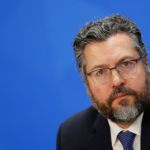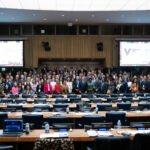Politicians, civic and ecclesiastical leaders, religious communities and pro-family organizations that oppose gender ideology and the LGBT agenda are in the crosshairs of the United Nations (UN).
The office of the UN High Commissioner for Human Rights (OHCHR), led by the socialist Michelle Bachelet, former president of Chile, is preparing a report that aims to ‘map’ people and entities that question ‘the validity of a wide range of sexual orientations and gender identities’.
The person in charge of the document is Víctor Madrigal-Borloz, a lawyer from Costa Rica, a close collaborator of the International Lesbian, Gay, Bisexual, Trans and Intersex Association (ILGA) and a founding member of the Costa Rican Association of International Law (ACODI), which operates as a legal office for LGBT cases. He worked in the Commission and the Inter-American Court of Human Rights and was awarded the title ‘Independent UN expert’ by Bachelet at the end of 2017.
For the elaboration of the report, Madrigal-Borloz starts from the assumption that the “gender approach” is unquestionable, supported by an “exhaustive” academic analysis, which validates the concept “gender” as a social construction without direct or necessary correlation with the biological sex, and encompassing a “wide range of identities”: homosexuals, lesbians, bisexuals, transsexuals, and so on.
Rejecting this perspective, according to the activist, fuels “violence and discrimination” and has repercussions on “sexual and reproductive rights”, and to call it an ideology is embracing “hate speech”.
In January, the office issued a call for contributions to the report especially aimed at “groups working at the intersections between gender and rights.” Read the original document here.
The text recognizes that ‘gender analysis’ has influenced the reinterpretation of the rights recognized in international norms, and expresses concerns about the actions in multilateral and regional bodies of individuals and groups who aim to eliminate the ‘gender framework’ from the instruments and processes of international human rights regulations and from national legislative and regulatory documents.”
Madrigal-Borloz wants to “map” who they are, where and how they act, and what arguments they use to do so. He requests that it be reported, what political and religious leaders have promoted, with their statements, the “prolongation, modification or indefinite suppression of actions, activities, projects, public policies or application of gender approaches.”
And he especially asks: “Who are the main actors who claim that LGBT human rights defenders are promoting the so-called ‘gender ideology’?” Apparently, there will be a nominal mention of these actors in the report, in a kind of a ‘blacklist’.
Governments will also be ‘listed’ as information is requested as to whether or not the authorities have adopted “definitions of gender and its related concepts” in public policies and laws; whether or not states have adhered to treaties that imply such an approach, and whether or not they provide sex education in schools that addresses “diverse gender identities.”
The UN Czar appears to be taking the approach of the Southern Poverty Law Center, which creates lists of “hate groups” by integrating those with a different cultural and political perspective than its own.
The UN also wants to know “what the main arguments are” of those who combat gender ideology and how “traditional and religious narratives” are used to refer to the “protection of the family”. It seems to be looking for a “model” and then deconstructing it piece by piece.
It also inquires whether “there are initiatives adopted by States in relation to the right to freedom of religion, belief or conscience (including the figure of conscientious objection) that have had the practical effect of limiting the enjoyment of human rights (including sexual and reproductive rights) of LGBT people.”.
Note, that Madrigal does not recognize – in that paragraph – conscientious objection as a right and that, in line with what is currently happening in the Inter-American human rights system where Madrigal worked, he intends to superimpose the supposed sexual, reproductive rights and “gender identity” to the – widely consolidated – fundamental rights of religious freedom, freedom of belief or conscience.
In July 2019, the Costa Rican published another report for the Office of the High Commissioner where he asked the states to “take decisive measures” against religious leaders who oppose the “LGBT rights,” including access to the so-called ‘same-sex marriage’.
The deadline to send in contributions to the report is February 28, which will be presented at the 47th session of the Human Rights Council, starting on June 21, till July 9, 2021.



